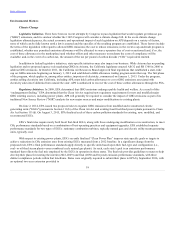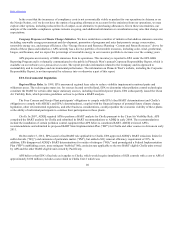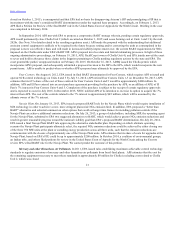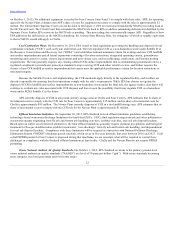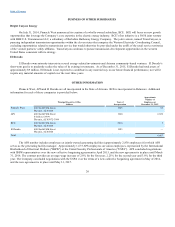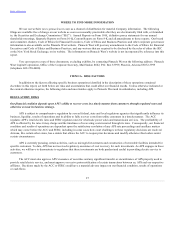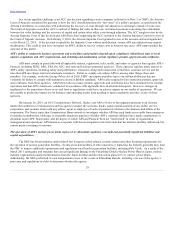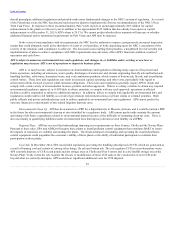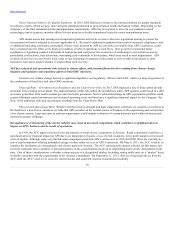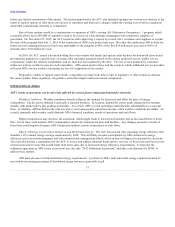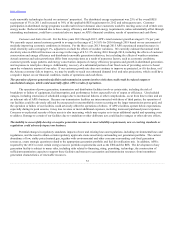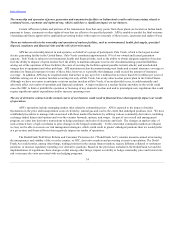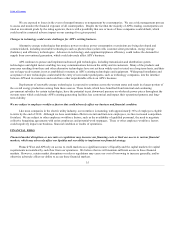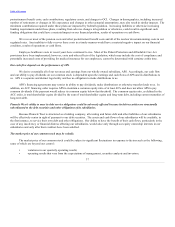APS 2015 Annual Report Download - page 31
Download and view the complete annual report
Please find page 31 of the 2015 APS annual report below. You can navigate through the pages in the report by either clicking on the pages listed below, or by using the keyword search tool below to find specific information within the annual report.
Table of Contents
In a recent appellate challenge to an ACC rate decision regarding a water company (referred to in Note 3 as "SIB"), the Arizona
Court of Appeals considered the question of how the ACC should determine the “fair value” of a utility’s property, as specified in the
Arizona Constitution, in connection with authorizing the recovery of costs through rate adjustors or surcharges outside of a rate case.
The Court of Appeals reversed the ACC’s method of finding fair value in that case, and raised questions concerning the relationship
between fair value findings and the recovery of capital and certain other utility costs through adjustors. The ACC sought review by the
Arizona Supreme Court of this decision and APS filed a brief supporting the ACC’s petition to the Arizona Supreme Court for review of
the Court of Appeals’ decision. On February 9, 2016, the Arizona Supreme Court granted review of the decision and oral argument is
set for March 22, 2016. If the decision is upheld by the Supreme Court without modification, certain APS rate adjustors may require
modification. This could in turn have an impact on APS’s ability to recover certain costs in between rate cases. APS cannot predict the
outcome of this matter.
APS’s ability to conduct its business operations and avoid fines and penalties depends upon compliance with federal, state or local
statutes, regulations and ACC requirements, and obtaining and maintaining certain regulatory permits, approvals and certificates.
APS must comply in good faith with all applicable statutes, regulations, rules, tariffs, and orders of agencies that regulate APS’s
business, including FERC, NRC, EPA, the ACC, and state and local governmental agencies. These agencies regulate many aspects of
APS’s utility operations, including safety and performance, emissions, siting and construction of facilities, customer service and the
rates that APS can charge retail and wholesale customers. Failure to comply can subject APS to, among other things, fines and
penalties. For example, under the Energy Policy Act of 2005, FERC can impose penalties (up to one million dollars per day per
violation) for failure to comply with mandatory electric reliability standards. APS is also required to have numerous permits, approvals
and certificates from these agencies. APS believes the necessary permits, approvals and certificates have been obtained for its existing
operations and that APS’s business is conducted in accordance with applicable laws in all material respects. However, changes in
regulations or the imposition of new or revised laws or regulations could have an adverse impact on our results of operations. We are
also unable to predict the impact on our business and operating results from pending or future regulatory activities of any of these
agencies.
On January 28, 2016, an ACC Commissioner, Robert L. Burns, sent APS a Notice of Investigation pursuant to an Arizona
statute that authorizes a Commissioner and his agents to inspect the accounts, books, papers and documents of any public service
corporation, and examine under oath any officer, agent or employee of such corporation in relation to the business and affairs of the
corporation. The Notice states that Commissioner Burns intends to investigate whether APS has used funds recoverable from ratepayers
for political contributions, lobbying, or charitable donations purposes; whether APS’s corporate affiliates have made contributions or
donations under APS’ brand name; and the degree to which APS and Pinnacle West are “intertwined” in terms of organization,
management and operations. APS intends to cooperate with this investigation to the full extent that the matter is lawfully authorized, but
cannot predict its timing or outcome.
The operation of APS’s nuclear power plant exposes it to substantial regulatory oversight and potentially significant liabilities and
capital expenditures.
The NRC has broad authority under federal law to impose safety-related, security-related and other licensing requirements for
the operation of nuclear generation facilities. Events at nuclear facilities of other operators or impacting the industry generally may lead
the NRC to impose additional requirements and regulations on all nuclear generation facilities, including Palo Verde. As a result of the
March 2011 earthquake and tsunamis that caused significant damage to the Fukushima Daiichi Nuclear Power Plant in Japan, various
industry organizations analyzed information from the Japan incident and develop action plans for U.S. nuclear power plants.
Additionally, the NRC performed its own independent review of the events at Fukushima Daiichi, including a review of the agency’s
processes and regulations in order to determine whether the agency
28


